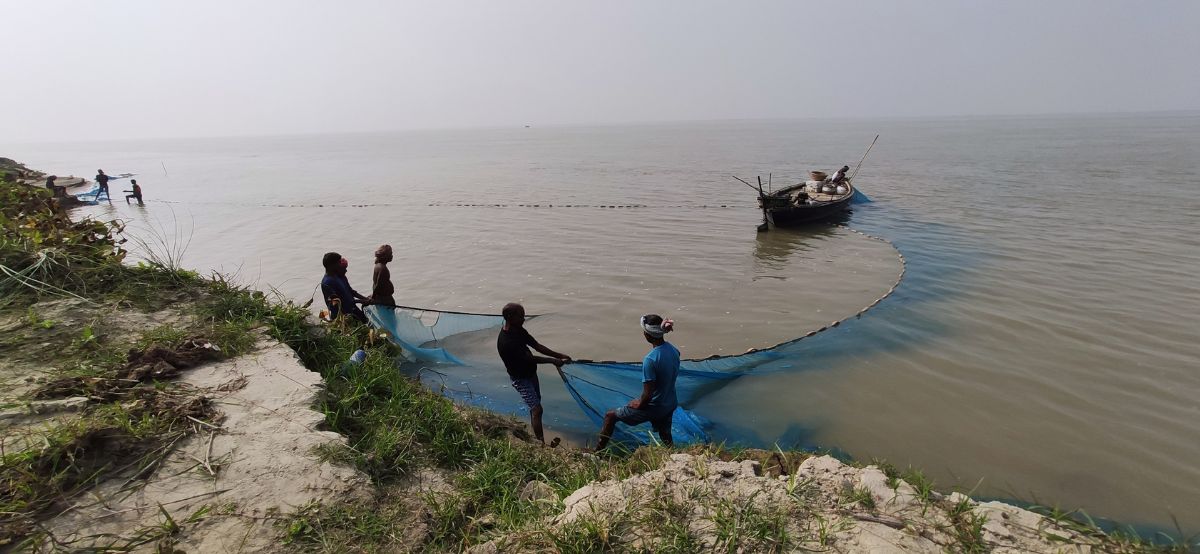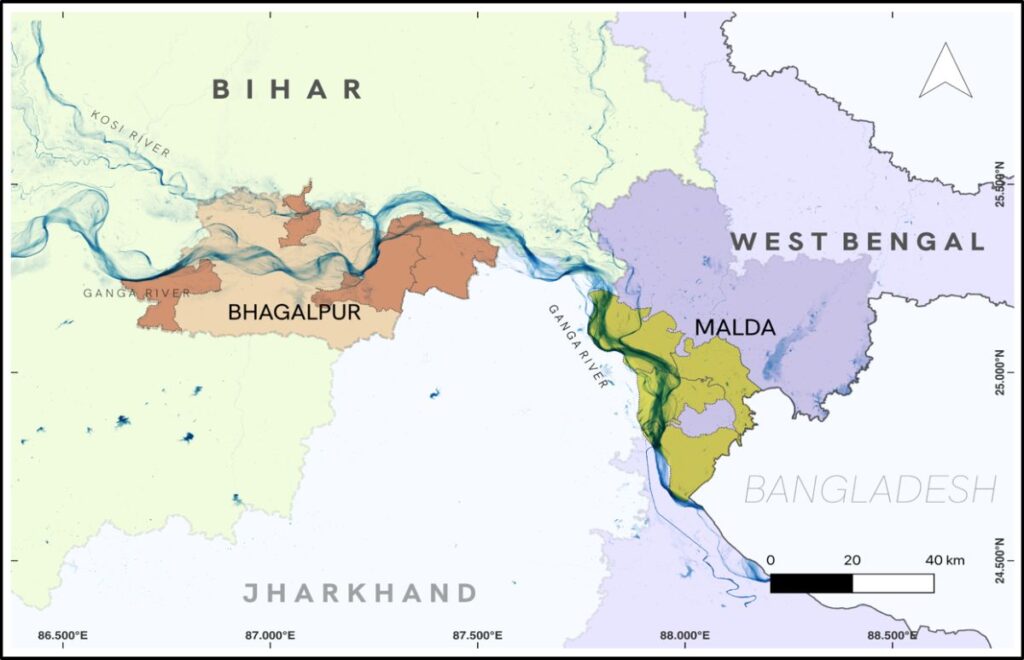Achieving co-existence between freshwater biodiversity and river-dependent fisheries is becoming increasingly challenging in the Gangetic plains. The negative ecological effects of dams and other impoundments, water pollution, habitat destruction from sand mining, impact of water transport, riverfront development, and many other stressors are the major reasons affecting riverine wildlife populations and quality and quantity of fish stocks in rivers. Additionally, unmanaged fisheries threaten aquatic wildlife which are unintentionally caught as bycatch, or through overharvesting of fish and hunting of wildlife, or competitive interactions for space and resources.

Representational photo of river-dependent fisheries in the Gangetic plains of West Bengal. ©Soumen Bakshi/WCT
Sustainability of fisheries critically hinges on social equity for fisher folk to meet their aspirations for economic development, which can enable them to become meaningful stakeholders in environmental and wildlife conservation.
Fisher folk in the Gangetic plains have also faced poverty and social marginalisation for centuries, and the largely open-access nature of river fishing poses challenges to effective governance and stewardship. In such a situation, sustainability of fisheries critically hinges on social equity for fisher folk to meet their aspirations for economic development, which can enable them to become meaningful stakeholders in environmental and wildlife conservation. With the goal of making riverine fisheries management sustainable, it is important to identify pathways which fishers can access to gain stable income, security, and access to social welfare schemes. One way to achieve this could be through small-scale aquaculture (fish farming) in river-floodplain wetland ecosystems. Pond-based aquaculture is fast gaining prominence for its potential in conserving freshwater biodiversity alongside socio-economic development of fisher folk. Research is, therefore, needed on assessing the tradeoffs or synergies involved in outcomes of pond aquaculture for development and conservation.
In 2024, Nikita Mohan, a M.Sc. (Wildlife Biology and Conservation) student from the National Centre for Biological Sciences-TIFR, conducted her thesis research with Wildlife Conservation Trust’s Riverine Ecosystems and Livelihoods (REAL) programme, on assessing the potential of aquaculture-based fishery livelihoods to support fishers wanting to transition from riverine capture fisheries. This fascinating interdisciplinary study investigated the socio-economic, institutional, cultural, and ecological barriers and opportunities involved in transitioning from riverine capture fisheries to wetland and pond-based aquaculture in two districts of Bihar (Bhagalpur) and West Bengal (Malda) in the lower Gangetic plains, both known to have productive and extensive fisheries.

Map indicating the two study locations of Bhagalpur and Malda. ©WCT
The motivation for the study came from knowledge of a long-standing perception among local riverine fishers that receiving secure ownership and harvest rights to ponds would help them overcome poverty and exit riverine fisheries. The study involved evaluation of river stretches and aquaculture ponds for fisheries productivity and biodiversity, understanding fishers’ perceptions and experiences to identify barriers to aquaculture adoption, evaluating institutional structures and processes affecting these transitions, and finally, understanding their social and ecological consequences.
The findings from the study revealed significant institutional, economic, socio-cultural, and ecological barriers in the uptake of pond-based aquaculture by river fisher groups. According to the findings, this was due to:
- ineffective and inadequate institutional governance or attention to fisheries,
- strong control of anti-social and criminal elements in floodplain spaces,
- local elite capture of ponds,
- landlessness and lack of capital,
- caste-based conflict and contestations over traditional identity in securing rights and access, and
- poor maintenance of ponds.
Interestingly, in Bhagalpur, the results showed that a breakdown of institutional governance and social conflicts nullified the opportunities for fishers to access aquaculture in spite of highly productive ecological conditions in ponds and wetlands. In contrast, a trend towards privatisation of aquaculture-based fisheries was evident in Malda, which led to lower conflict over access to ponds but also more inequity, and poorer outcomes for the ecological condition of wetlands. Introduction of invasive alien fish species was also an undesirable ecological outcome which also did not lead to net social benefits. This demonstrated that the transition from riverine capture fisheries to pond-based aquaculture in the Gangetic floodplains presented complicated trade-offs.
Aquaculture, in the present context, thus may not be a fruitful pathway to mitigate the impacts of declining riverine fisheries on both human, livelihoods, and wildlife conservation. Efforts to maximise fish production through aquaculture, thus needs to be based on improving access and benefit-sharing mechanisms for the most vulnerable river fishers in order to have any impact on wildlife conservation and restoration of riverine and wetland ecosystems.
About the author: Dr. Nachiket Kelkar is a riverine ecologist and conservationist and heads WCT’s Riverine Ecosystem And Livelihoods (REAL) programme.
Disclaimer: The authors are associated with Wildlife Conservation Trust. The views and opinions expressed in the article are their own and do not necessarily reflect the views and opinions of Wildlife Conservation Trust.
Your donations support our on-ground operations, helping us meet our conservation goals.
Related Links
- River Animals and River People: For a Shared Future
- Riverine Ecosystems and Livelihoods Programme
- Fish Out of Water – One Too Many
- A Walk to Remember: The Fishers’ Foot Migration
- 25 Reasons Why the WTO Must End Subsidies That Drive Overfishing
